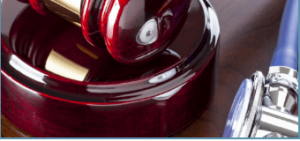Florida Law Weekly – Cases From Week Of January 15th, 2016

FLORIDA LAW WEEKLY
VOLUME 41, NUMBER 2
“Free Government Benefits Inadmissible.”
CASES FROM THE WEEK OF JANUARY 15, 2016
COURT PROPERLY EXCLUDED EVIDENCE PERTAINING TO FREE OR LOW-COST MEDICAL CARE–TRIAL COURT SHOULD NOT HAVE LIMITED NON-ECONOMIC DAMAGES IN A MEDICAL MALPRACTICE CASE BASED ON THE STATUTORY CAPS.
Go v. Normil, 41 Fla. Law Weekly D91 (Fla. 4th DCA January 6, 2016):
In this case very sad case, a child was admitted to Bethesda with a high fever, vomiting and a stiff neck. After two weeks of treatment there, the child’s condition worsened and he was transferred to Miami Children’s. Upon arrival, it was determined that the child had suffered a stroke, based on the presence of certain viruses, and an expert testified that more likely than not had they treated the initial infections earlier, the child would not have suffered a stroke.
Although the child’s physical development was largely unaffected, his neurological and behavioral development was severely impacted. The plaintiff introduced testimony that the child was unable to communicate or follow directions, engages in self-injurious behavior, suffers from morbid obesity and an insatiable appetite, and has little or no awareness for his own safety, such that he requires constant supervision. The witness opined that the child’s disability is permanent and total, and he will never live independently.
The jury returned a verdict for $16 million in economic damages and $6 million in non-economic damages. The trial judge reduced the non-economic damage award to $500 per claimant.
In the face of Joerg v. State Farm, where the supreme court has now held that evidence of future benefits for Medicare or Medicaid is inadmissible as collateral sources, because the right of reimbursement means that government programs are not free or unearned, the court ruled the trial judge properly excluded such evidence. Also, the future availability of said programs is speculative, and allowing tortfeasors to introduce evidence of payments from these governmental programs allows them a windfall. See, Id.
Based on the decision in North Broward v. Kalitan, the Fourth District also reiterated that the caps are unconstitutional both in wrongful death and personal injury actions (because they violate equal protection) and therefore, it was error for the trial judge to limit the recovery for non-economic damages to the caps.
COURT HAD TO DENY A PETITION FOR WRIT OF PROHIBITION WHICH WAS LEGALLY SUFFICIENT, BUT FILED UNTIMELY.
State v. Oliu, 41 Fla. Law Weekly D82 (Fla. 3rd DCA January 6, 2016):
The defendant was a City of Sweetwater police officer charged with official misconduct and fraud, allegedly enabled by his status as a police officer. The trial judge acknowledged having a previous attorney-client relationship with the City of Sweetwater Police Department, which appeared as a third-party duces tecum witness before the trial judge. The judge also acknowledged having personal and extrajudicial knowledge, regarding facts asserted during that discovery dispute as well as a previous attorney-client relationship with the defendant who he had represented in another case.
The state moved to disqualify the trial judge. The court found it to be legally sufficient because the alleged facts would create in a reasonably prudent person a well-founded fear of not receiving a fair and impartial trial.
However, because the motion to disqualify was filed in September based on disclosures that were made in July and in August, the Third District reluctantly had to deny the petition.
ORDER COMPELLING PRODUCTION OF NON-PARTY INSURER’S CLAIM FILE DEPARTED FROM THE ESSENTIAL REQUIREMENTS OF LAW, WHEN THE INSURER WAS NOT PROPERLY SERVED WITH A LAWFUL SUBPOENA PURSUANT TO RULE 1.351.
Geico v. Chmielewski, 41 Fla. Law Weekly D84 (Fla. 2nd DCA January 6, 2016):
Without properly serving a lawful subpoena in the manner prescribed by F.R.C.P. 1.351, the trial court could not compel the production of documents.
POST-TRIAL INTERVIEW OF JUROR NECESSARY WHERE INTERVIEW WITH FOREPERSON FOLLOWING RETRIAL ON DAMAGES DISCLOSED THAT AFTER THE RETURN OF THE VERDICT AND THE RETRIAL, THE FOREPERSON HAD RECEIVED A TEXT MESSAGE FROM A SECOND JUROR INDICATING THAT THE SECOND JUROR HAD GOOGLED THE PREVIOUS VERDICT IN THE CASE–THIS RECEIPT OF NON-RECORD INFORMATION WAS AN OVERT ACT THAT COULD HAVE PREJUDICIOUSLY AFFECTED THE JURY IN REACHING THE VERDICT.
Philip Morris v. Naugle, 41 Fla. Law Weekly D105 (Fla. 4th DCA January 6, 2016):
There was a retrial on damages, and the court interviewed the jury foreperson. The interview disclosed that after the verdict came back in the damages retrial, the foreperson had received a text from a second juror indicating that over the weekend before the verdict, the second juror had googled the previous verdict in the case. Receipt of that kind of non-record information, concerning the amount of a prior verdict is an overt act which might have prejudicially affected the jury in reaching its verdict. The existence of that text also established reasonable grounds to believe that some juror misconduct occurred, constituting a legal basis for a juror interview.
ERROR TO DIRECT VERDICT IN FAVOR OF DEFENDANT ON “FALL ON THE STAIRS” PREMISES CASE–ALTHOUGH PLAINTIFF DID NOT TESTIFY EXACTLY WHAT MADE HER FALL, EXPERT EVIDENCE AND PHOTO OF STEPS ESTABLISHED THAT THEY WERE IN DISREPAIR.
Christakis v. Tivoli Terrace, 41 Fla. Law Weekly D121 (Fla. 4th DCA January 6, 2016):
Generally, a directed verdict is not appropriate in cases where there is conflicting evidence as to causation. In this case, the plaintiff showed that the steps on which she fell were in disrepair. Although she could not testify as to exactly what made her fall, the evidence presented by both the expert, as well as the photos of the steps showed their damaged condition.
